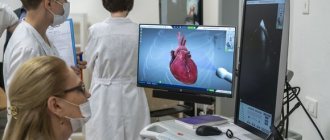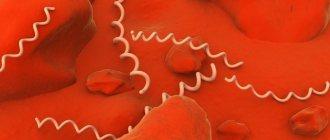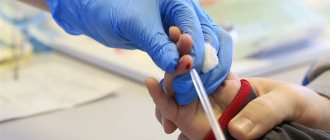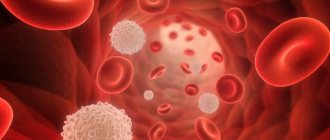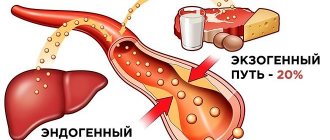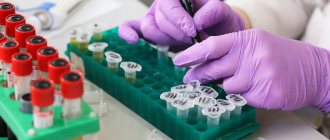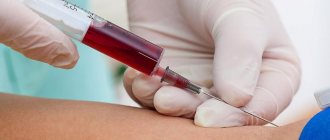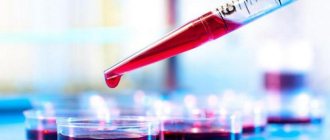Atherosclerosis
Diabetes
Arthritis
Gout
7266 14 October
IMPORTANT!
The information in this section cannot be used for self-diagnosis and self-treatment.
In case of pain or other exacerbation of the disease, diagnostic tests should be prescribed only by the attending physician. To make a diagnosis and properly prescribe treatment, you should contact your doctor. We remind you that independent interpretation of the results is unacceptable; the information below is for reference only.
Cholesterol: indications for use, rules for preparing for the test, interpretation of results and normal indicators.
Why is it important to measure your blood cholesterol levels?
Cholesterol is an indicator whose level is important to monitor not only in old age, but also in youth.
Over the past few decades, the number of patients suffering from atherosclerosis has increased dramatically. The danger of cholesterol is that it can be deposited on the walls of blood vessels in the form of atherosclerotic plaques. When a plaque clogs a vessel, a heart attack, stroke, kidney failure and other illnesses can occur, leading to disability and even death. Important:
Often atherosclerotic plaques form in large vessels in places where they bend. These are the vessels around the heart, as well as those leading to the brain.
Not everyone knows that there are two types of cholesterol. People call them “good” and “bad”. “Good” cholesterol is produced by the human body. It is necessary for normal metabolic processes and makes up approximately 80% of the total cholesterol. “Bad” cholesterol can only be obtained from the outside, that is, through food.
The test cannot divide cholesterol into good and bad; it will show its overall level in a person’s blood. If it is elevated, other examinations should be performed that will show the condition of the patient’s blood vessels, the presence of plaques and other problems. This is why it is important to regularly take blood tests for cholesterol.
You can find out more information about this and many other important aspects of health related to blood pressure, osteochondrosis, atherosclerosis by becoming a member of the Club of Former Hypertensive Patients
.
Join our community, download gymnastics, which has already helped hundreds of thousands of people overcome blood pressure surges and hypertension. Get the most up-to-date and correct information, ask your questions to Dr. Shishonin and just communicate.
Decoding the results
As we have already found out, it cannot be said that cholesterol is an absolute evil and the lower its level in the blood, the better. Moreover, from a medical point of view, cholesterol levels that are too low carry even greater health risks than cholesterol levels that are too high. Indicators should be within normal limits.
What is the normal level of cholesterol in the blood?
The normal cholesterol concentration depends on the age and gender of the person (see table)[8].
| Age | Norm in men, mmol/l | Norm for women, mmol/l |
| Up to 30 days | 1,4–3,9 | 1,6–4,01 |
| 1–5 months | 2,09–3,8 | 1,6–3,65 |
| 6–12 months | 1,9–4,63 | 1,97–5,59 |
| 1–3 years | 2,2–4,71 | 2,79–4,99 |
| 4–6 years | 2,84–5,61 | 2,74–4,99 |
| 7–9 years | 2,8–5,46 | 2,6–5,43 |
| 10–12 years | 2,7–5,77 | 2,72–5,64 |
| 13–15 years old | 2,35–5,28 | 2,79–5,3 |
| 16–17 years old | 2,12–4,97 | 2,38–6,05 |
| ≥ 18 years old | 2–5,18 | 2–5,18 |
| <5.18 – normal level; 5.18–6.19 – moderately elevated; > 6.22 – high level | <5.18 – normal level; 5.18–6.19 – moderately elevated; > 6.22 – high level |
The normal triglyceride content for men and women over 18 years of age is 0.2–1.7 mmol/l. And the normal HDL level for men is > 1.45 mmol/l. The HDL standard for women is > 1.68 mmol/l. The normal level of low-density lipoproteins in men is -
Be that as it may, the content of this total cholesterol above the norm means the need for a more thorough and in-depth analysis of the patient’s lipid profile.
Why is cholesterol high?
Let's say the analysis showed that your cholesterol level is higher than normal. This is typical for diseases such as:
- congenital hyperlipidemia[9];
- pathologies of the hepatobiliary system;
- pancreas cancer;
- diabetes;
- hypothyroidism;
- kidney pathologies.
Sometimes high cholesterol levels are a consequence of an unhealthy lifestyle[10]: in people suffering from alcoholism and obesity, as well as in those who are too fond of fatty foods, this indicator approaches the upper limit of normal and sometimes even crosses it.
And finally, during pregnancy there is also often a slight increase in cholesterol levels.
Why is cholesterol low?
If tests show low cholesterol, this may also be a sign of certain diseases[11]:
- hypolipoproteinemia;
- hyperthyroidism;
- liver cancer and other oncological diseases;
- liver cirrhosis, especially in the later stages;
- chronic anemia;
- bone marrow pathologies;
- chronic pulmonary pathology.
A decrease in cholesterol concentration is also characteristic of acute infections, sepsis and extensive burns. Errors in diet can also reduce this indicator [12]: people who are overly addicted to fasting and very strict diets, as well as those who consume too many fatty acids (omegas), often have low cholesterol levels.
No matter what your blood test shows, you should never try to raise or lower your cholesterol levels on your own, without consulting your doctor. In the vast majority of cases, high or low levels of this compound have very specific reasons - diseases that need to be treated.
How to prepare for complex analyzes
Dr. Shishonin says that such an analysis can be done by anyone without special training. However, this only applies to those cases where only one indicator is to be analyzed, that is, cholesterol.
If the patient is also measuring blood sugar (glucose) levels, there are some limitations to consider. Before this analysis you must:
- don't have breakfast;
- do not drink tea, coffee, carbonated drinks, juices;
- In the morning you can only drink clean water.
These restrictions are necessary in order not to provoke the release of sugar into the blood, otherwise the analysis will be unreliable.
Cholesterol does not have a direct relationship between its level in the blood and food intake. Therefore, you can take such an analysis at any time of the day, immediately after a meal or before a meal - it doesn’t matter.
On an empty stomach or not? Instructions on how to take blood tests correctly
Every time a doctor prescribes blood tests, the question arises of how to properly prepare for the procedure in order to get the most accurate result.
The head of the clinical diagnostic laboratory, Candidate of Medical Sciences Olga Anatolyevna Litinskaya spoke about the most basic rules of preparation.
1. Most tests are done on an empty stomach. This means that 6-8 hours should pass between the last meal and the procedure. These tests include all biochemical indicators, some hormones, serological tests (HIV, hepatitis, syphilis), coagulogram. Before donating blood, at least 10-12 hours must pass for lipid spectrum indicators (cholesterol, triglycerides). Before taking a general blood test, you can indulge in a light breakfast. But after it, blood can be donated no earlier than 2-3 hours later. Juice, tea and coffee, especially with sugar, are also prohibited. But you can drink some water in the morning and brush your teeth. Dinner the day before should be light, without fatty foods, as this can lead to “turbidity” of the blood serum and complicate diagnosis. 2. Many hormones are subject to daily fluctuations, so they must be taken strictly before 12.00. These are thyroid hormones, parathyroid hormone, ACTH, cortisol and some others. 3. The test result may be affected by stress or physical activity (running, climbing stairs). It is advisable to rest for 10-15 minutes before the procedure and calm down. 4. Before donating blood, it is not recommended to take any medications, except in cases where it is necessary to determine the concentration of a substance in the blood. 5. Do not smoke an hour before the test, especially important for donating blood for glucose. 6. You cannot donate blood after an X-ray examination, CT and MRI, or physiotherapeutic procedures. 7. Special requirements for women of reproductive age (before menopause). Hormones such as FSH, LH, prolactin, estriol, estradiol, progesterone are released on certain days of the menstrual cycle. Be sure to follow your doctor's advice. 8. But PCR, genetic and autoimmune tests, allergy tests do not require special preparation. They can be taken at any time of the day. And one more important clarification. Different laboratories may use different methods for working with blood, and even the units of measurement may differ. It is correct to compare only those results that were performed in the same laboratory and at the same time of day. This is necessary for those who regularly donate blood for the same tests. The clinical diagnostic laboratory of the Federal State Budgetary Institution "NMITs TPM" of the Ministry of Health of Russia offers a wide range of laboratory services. We have modern equipment, qualified personnel, extensive experience and federal quality control at our disposal.
Most analyzes are completed in one business day.
Self-monitoring and frequency of cholesterol measurement
Controlling blood cholesterol levels is very important for human health, so doctors recommend taking a general and biochemical blood test at least 1-2 times a year. This frequency of tests is necessary for any patient, but for older people, monthly monitoring of cholesterol levels is recommended in order to avoid concomitant diseases, as well as to recognize the problem in time and begin its treatment. In addition, monthly measurement of the level of the most important indicators will help monitor the course of the disease, if it is already progressing, and monitor the progress of treatment.
Advice:
Older people should measure their cholesterol levels every month.
Today, one of the methods for effectively monitoring one’s own health is the use of special devices at home that can measure several indicators at once: blood glucose levels, the amount of cholesterol and other substances. Using such a device, you can easily monitor your cholesterol at home, and then provide the results to your doctor at your appointment.
These devices use test strips that react to certain compounds. Each indicator has its own strip. Then the level of each substance is displayed on the screen, and you can immediately understand whether the indicator is normal at the moment.
Where is blood taken for cholesterol: from a vein or from a finger
The object of the study is venous blood, because it contains waste lipoproteins discarded by cells after they are used for their own purposes. The capillary composition is close to the arterial one: purified and oxygenated. Blood from a vein is required, and not from the soft tissue of a finger, also because to determine cholesterol levels, a larger volume of biological material is required than, for example, for a general analysis.
Theoretically, the required volume can be squeezed out from a finger, but this will either take a lot of time, or the blood will be diluted by the squeezed interstitial fluid. And since the unit of measurement for cholesterol is mmol/l, this liquid will distort the result, and the values will be lower than the true ones.
How to prepare for analysis
There is only one limitation that can be regarded as preparation for a blood test for cholesterol. On the eve of the test and immediately before it, you should not actively engage in sports or heavy physical activity. This can cause blood cholesterol levels to drop or rise sharply.
This is a complex biochemical dependence, which is being studied by specialists, and patients just need to know that before taking such an analysis they should not go to the gym. The restriction does not apply to everyday life and activities such as walking. Follow this recommendation and you will get reliable results from your cholesterol blood test.
In what cases is analysis prescribed?
A routine lipid profile is required if there is a history of at least one of the following:
- diseases of the cardiovascular system;
- obesity;
- endocrine pathologies (especially diabetes and hypothyroidism);
- long-term smoking experience;
- pregnancy;
- age over 45 years;
- damage to the liver, intestinal absorption function, pancreas, kidneys (nephrotic syndrome);
- treatment with statins.
Indications for an urgent lipid profile:
- pain in the heart area;
- severe swelling of unknown etiology;
- weak urination;
- intermittent claudication;
- severe hypertension.
A referral for analysis can be issued by a general practitioner or a specialist in a related field (gastroenterologist, cardiologist, endocrinologist, gynecologist).
Complexes with this research
Expanded hospital complex Expanded infectious screening for prevention and hospitalization RUB 7,700 Composition
Blood biochemistry. 13 indicators Optimal biochemical blood test RUR 3,490 Composition
Male check-up No. 1 39 studies for annual preventive examination RUR 18,570 Composition
IN OTHER COMPLEXES
- Biochemistry of blood. 8 indicators 990 R
- Pregnancy planning. Clinical indicators 6,630 R
- Preventive check-up RUB 11,960
- Examination during pregnancy. 3rd trimester 9,620 RUR
- Cola and chips RUB 3,020
Conclusion
In some cases, the patient may need to fast the night before the cholesterol test. However, this is not always the case. The patient should talk with their doctor about whether they should fast before the test.
If fasting is not required, you can eat and drink safely before the test.
The CDC recommends that most adults have their cholesterol levels checked every 4 to 6 years. People with heart disease or diabetes should check their cholesterol levels more often.
Cholesterol test: what else should you do to prepare?
Before getting a cholesterol test, you should inform your doctor about your family history of heart health and any symptoms or medical conditions you are currently experiencing.
It is also important to tell your doctor about any medications, vitamins, herbs, or supplements you take.
If you are taking any medications that may affect your cholesterol levels, your doctor may ask you to stop taking them for a while before the test.
You should stop taking your medication only if your doctor asks you to do so and only under your doctor's supervision.
Foods to lower cholesterol
The foods we eat can affect our cholesterol levels over time.
Some foods help lower cholesterol levels. For example, soluble fiber can bind to cholesterol in the digestive system and remove it from the body. Additionally, polyunsaturated fats may help lower LDL levels.
According to Harvard Health, we should strive to include the following in our diet:
- barley
- oats
- okra
- eggplant
- nuts such as almonds, peanuts and walnuts
- kidney beans, garbanzo beans and black-eyed peas
- lentils
- fruits such as apples, citrus fruits and strawberries
- soybeans
